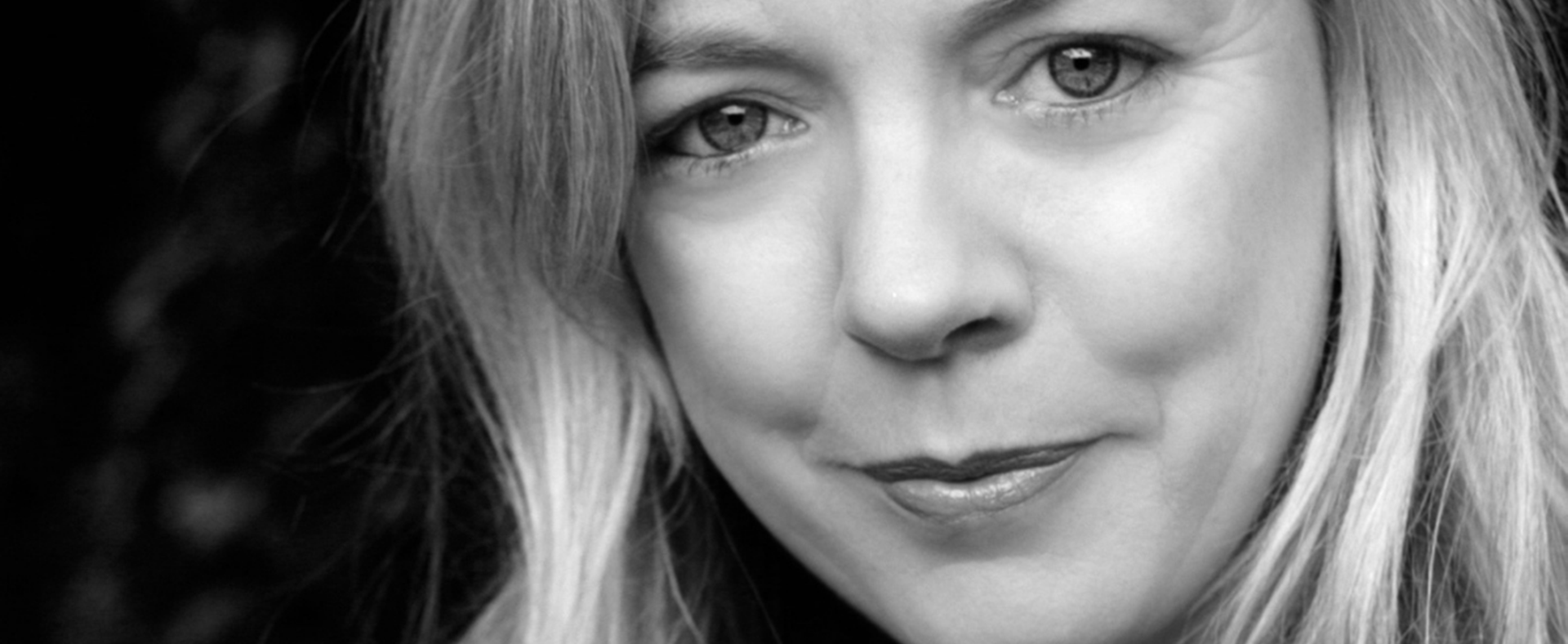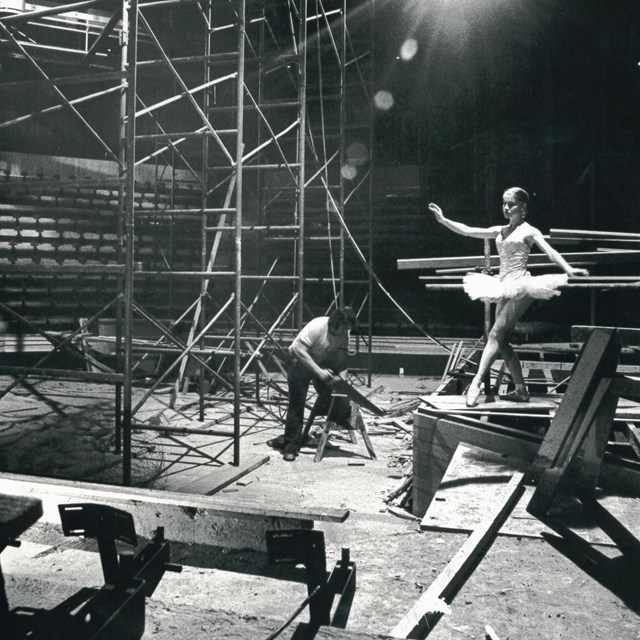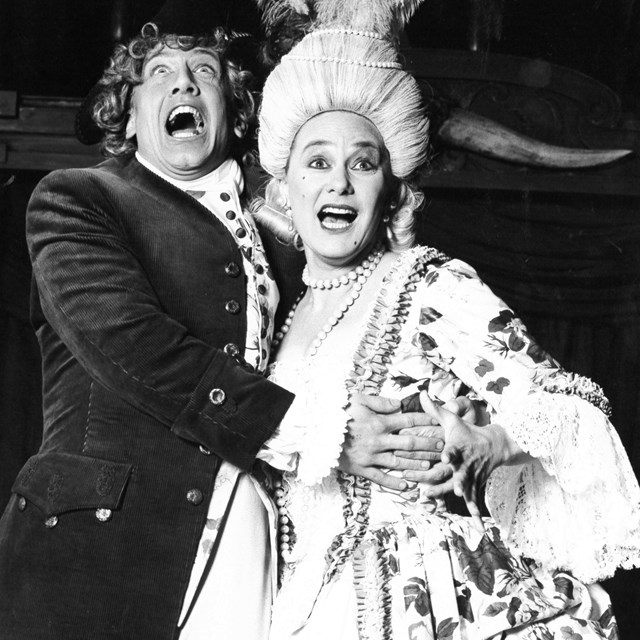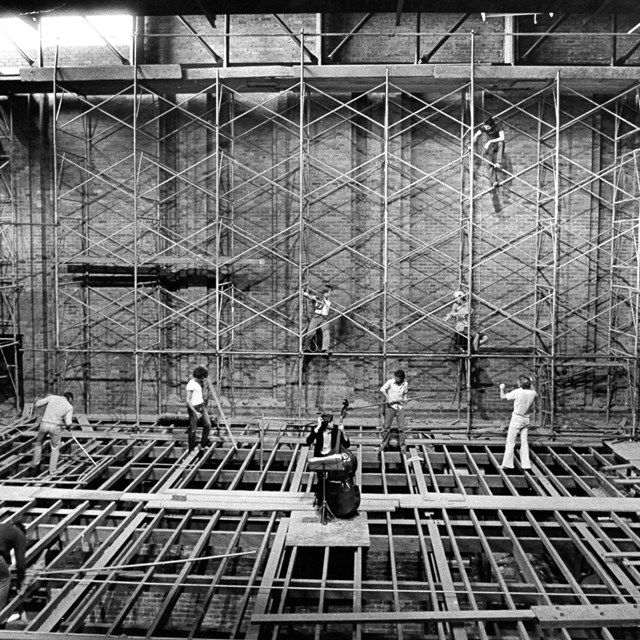An International Women’s Day comment
By Dr Suzie Miller, playwright and screenwriter
Writing this for International Women’s Day in the midst of so much turmoil around sexual assault, and the fact that a play I wrote in 2018 is still so current on this topic, makes me reflective, sad and outraged. In 2019 it was #metoo that allowed my play, Prima Facie, to find an audience on stage, yet in 2021 it feels more relevant than ever to reiterate the ideas behind the play.
When I wrote Prima Facie I never dreamed it would be taken up and championed as it has been. It was a hard play to write because always in the back of my mind was 'who cares about sexual assault?' or 'will I be accepted by the powers that be after writing this?' and 'everyone says a woman protagonist is a sure way to have your play fail in Australia'. I wasn’t sure if I would ever even find a theatre to produce it. Then a woman director decided it was timely and vital. Yes, sometimes women in power make all the difference.
Things have changed somewhat in theatre throughout my career. When I began working in theatre in 2000 there were no women playwrights in most mainstage programs, there were few opportunities in Australia and there were certainly no mentors available. I had two small children, and I never felt comfortable mentioning them in the industry because the one time I did, I was asked if I would 'still have time for rehearsals?' Most women playwrights were turning to TV where they felt their voices could be heard. I had left the law to write plays, but before me every message was 'women are not as good as men at writing plays'.
I decided, out of frustration when the feedback was 'we are deciding on merit alone', to conduct a little experiment, eager to discover if it was my writing or if it was Australia. I sent a play written by me to a large, contemporary, Sydney theatre hoping that its smaller studio space of about 100 might accept it into their program. At the same time, I sent that play to London and Scotland, and to New York.
The play was rejected in Australia, yet in London and Scotland, it was produced to critical acclaim, leading to further writing commissions in Ireland and London. A theatre in New York also produced the play, and it won an 'outstanding play' award and a 'writing with excellence award'. For me, I realised that in Australia this ‘lack of access’ was being disguised as ‘not good enough’. So, if a play by a woman was returned saying it was without merit, this was not a reliable assessment. Indeed, that very same play could go on to win awards for writing in the highly competitive theatre world of New York City.
It was a great release and relief for me. I could trust my instincts on what was good writing and what was not. I would stay in theatre and persevere. What of those women writers who did not have that relief and consequent belief in their own writing?
In the law I could point to my high grades at law school, and my achievements in the courtroom, but a play is judged by taste (with its inherent bias) and merit, yet it seemed it was also judged from the male perspective of the judges and artistic directors doing the choosing.
Prima Facie was a play I wrote because I had to! I needed to make sense of things. If one in three women are being sexually assaulted, and only one in ten of those women report it with only one in that ten securing a conviction, there is something very wrong with the system. I had grappled with the rules around evidence for sexual assault trials because I worked as a defence lawyer, believing strongly in innocence until proven guilty, yet realised that I could never cross-examine a rape survivor because I didn’t believe enough in the rules governing those cases.
The laws around rape and sexual assault cases have changed significantly over the years - some forms of rape (i.e. within a marriage) were LAWFUL not that long ago. Yet, despite the changes, there are still changes to be made because the archaic system is determined by many generations of white privileged men, not a woman’s lived experience of how sexual assault is experienced and remembered, or its ongoing effects.
We have now seen, in these last months, a devastating series of sexual assault allegations in the highest halls of government. I shudder when I hear that the sexual assault survivor is troubled or emotional - of course they are, and it’s surely irrelevant to their truth saying! I get angry when gendered assumptions are exercised indicating that because a man cannot remember the rape, it must be an unreliable accusation. Surely a man who has behaved sexually inappropriately or criminally has far more reason to ‘not remember’ than someone who has suffered profoundly. Shouldn’t we also suggest that perhaps the alleged male perpetrator is unreliable in his sworn reality?
This is not to say that we should damn anyone on an accusation. In my play, the audience SEE the sexual assault as it happens, then sit through the legal twisting of evidence that makes the survivor of the sexual assault appear a liar. In this story the audiences are not the judge and jury, but witnesses to what happened and then to what happened in the legal system to betray a woman’s truth.
Because so few women are believed when they make an accusation of sexual assault, survivors are wary to trust a system to arbitrate. And they should be. The question to be asked is WHY IS THE LEGAL SYSTEM FAILING SO MANY? Is it because the interests of perpetrators are more important? Or is it because so many men might have to look back upon their sexual history and worry about where the line of consent was?
Are we failing our young people – men and women – at high schools right now because we are not prepared to offer philosophy and thought around consent and sexual assault? Are we letting them down because we are not interrogating the online porn young people have access to and therefore not opening discussion around what is fantasy and what is reality? Yes, of course we are. It starts with acknowledging what we don’t know so we can hear and listen, then go about changing ways of educating and hearing lived experiences.
It’s International Women’s Day, and I acknowledge women all about the world, of all races and cultures. I acknowledge the intersectionality of gender with race, class, disability and culture, and how it compounds difficulties for women. I acknowledge them all for the hardships they have faced, the obstacles they are constantly confronted with, the challenges in the workplace, and seek to continue to find names for things that have not yet been named. Without names for things it is so hard in our slippery domestic and private worlds to be able to talk about times when women have felt profound fear and pain, powerless and voicelessness, and when they have recognised breaches of their human rights yet felt the frustration of not being able to express this appropriately.
We might be in the midst of a viral pandemic, but the pandemic of sexual assault and workplace sexual harassment has been about us for all time. Let’s eradicate that.
Dr Suzie Miller
8 March 2021
Suzie Miller is a contemporary international playwright, screenwriter and librettist, drawn to complex human stories often exploring injustice.
Miller’s plays have been produced in 40 productions around the world and won multiple prestigious awards. She has been commissioned by, or been in, residence at multiple prestigious theatres including London’s National Theatre, the National Theatre of Scotland, Griffin Theatre Australia, Theatre Gargantua Canada and La Boite Theatre Australia.
Suzie’s most recent and forthcoming productions include: Prima Facie (West End London, NY Broadway, Sydney, Melbourne and Brisbane; has won the Griffin National Award 2018; and in 2020 won the AWG Award for Stage; David Williamson Award for Excellence in Writing for Australian Theatre; and the prestigious Major AWG Award for the most outstanding work across all categories of Stage/TV/Film writing); The Mathematics of Longing (La Boite Brisbane and UK), Sunset Strip (Griffin Theatre Sydney, followed by an Australian national tour); DUST (Black Swan Theatre Perth; winner of the WA Premier’s Award for Scriptwriting), and Caress/Ache (Griffin Theatre Sydney).
She is currently under commission with Malthouse Theatre in Melbourne, in NYC and London; Sydney Theatre Company and Griffin Theatre Sydney; and is contracted to write four screenplays: Prima Facie, DUST, Life’s Short and TOUCH, and has created the TV series titled Creatures of Mayhem (Matchbox/NBC), is lead writer on Bruny and writes for complex TV.
Suzie has a background in both science and law. Miller is primarily based in both Sydney and London.
A gripping, award-winning interrogation of Australia's patriarchal justice system, Prima Facie will play at the Seymour from 23 Jun - 10 Jul 2021. Find out more and book tickets below.
Find out about Prima FacieWriting this for International Women’s Day in the midst of so much turmoil around sexual assault, and the fact that a play I wrote in 2018 is still so current on this topic, makes me reflective, sad and outraged. In 2019 it was #metoo that allowed my play, Prima Facie, to find an audience on stage, yet in 2021 it feels more relevant than ever to reiterate the ideas behind the play.
When I wrote Prima Facie I never dreamed it would be taken up and championed as it has been. It was a hard play to write because always in the back of my mind was 'who cares about sexual assault?' or 'will I be accepted by the powers that be after writing this?' and 'everyone says a woman protagonist is a sure way to have your play fail in Australia'. I wasn’t sure if I would ever even find a theatre to produce it. Then a woman director decided it was timely and vital. Yes, sometimes women in power make all the difference.
Things have changed somewhat in theatre throughout my career. When I began working in theatre in 2000 there were no women playwrights in most mainstage programs, there were few opportunities in Australia and there were certainly no mentors available. I had two small children, and I never felt comfortable mentioning them in the industry because the one time I did, I was asked if I would 'still have time for rehearsals?' Most women playwrights were turning to TV where they felt their voices could be heard. I had left the law to write plays, but before me every message was 'women are not as good as men at writing plays'.
I decided, out of frustration when the feedback was 'we are deciding on merit alone', to conduct a little experiment, eager to discover if it was my writing or if it was Australia. I sent a play written by me to a large, contemporary, Sydney theatre hoping that its smaller studio space of about 100 might accept it into their program. At the same time, I sent that play to London and Scotland, and to New York.
The play was rejected in Australia, yet in London and Scotland, it was produced to critical acclaim, leading to further writing commissions in Ireland and London. A theatre in New York also produced the play, and it won an 'outstanding play' award and a 'writing with excellence award'. For me, I realised that in Australia this ‘lack of access’ was being disguised as ‘not good enough’. So, if a play by a woman was returned saying it was without merit, this was not a reliable assessment. Indeed, that very same play could go on to win awards for writing in the highly competitive theatre world of New York City.
It was a great release and relief for me. I could trust my instincts on what was good writing and what was not. I would stay in theatre and persevere. What of those women writers who did not have that relief and consequent belief in their own writing?
In the law I could point to my high grades at law school, and my achievements in the courtroom, but a play is judged by taste (with its inherent bias) and merit, yet it seemed it was also judged from the male perspective of the judges and artistic directors doing the choosing.
Prima Facie was a play I wrote because I had to! I needed to make sense of things. If one in three women are being sexually assaulted, and only one in ten of those women report it with only one in that ten securing a conviction, there is something very wrong with the system. I had grappled with the rules around evidence for sexual assault trials because I worked as a defence lawyer, believing strongly in innocence until proven guilty, yet realised that I could never cross-examine a rape survivor because I didn’t believe enough in the rules governing those cases.
The laws around rape and sexual assault cases have changed significantly over the years - some forms of rape (i.e. within a marriage) were LAWFUL not that long ago. Yet, despite the changes, there are still changes to be made because the archaic system is determined by many generations of white privileged men, not a woman’s lived experience of how sexual assault is experienced and remembered, or its ongoing effects.
We have now seen, in these last months, a devastating series of sexual assault allegations in the highest halls of government. I shudder when I hear that the sexual assault survivor is troubled or emotional - of course they are, and it’s surely irrelevant to their truth saying! I get angry when gendered assumptions are exercised indicating that because a man cannot remember the rape, it must be an unreliable accusation. Surely a man who has behaved sexually inappropriately or criminally has far more reason to ‘not remember’ than someone who has suffered profoundly. Shouldn’t we also suggest that perhaps the alleged male perpetrator is unreliable in his sworn reality?
This is not to say that we should damn anyone on an accusation. In my play, the audience SEE the sexual assault as it happens, then sit through the legal twisting of evidence that makes the survivor of the sexual assault appear a liar. In this story the audiences are not the judge and jury, but witnesses to what happened and then to what happened in the legal system to betray a woman’s truth.
Because so few women are believed when they make an accusation of sexual assault, survivors are wary to trust a system to arbitrate. And they should be. The question to be asked is WHY IS THE LEGAL SYSTEM FAILING SO MANY? Is it because the interests of perpetrators are more important? Or is it because so many men might have to look back upon their sexual history and worry about where the line of consent was?
Are we failing our young people – men and women – at high schools right now because we are not prepared to offer philosophy and thought around consent and sexual assault? Are we letting them down because we are not interrogating the online porn young people have access to and therefore not opening discussion around what is fantasy and what is reality? Yes, of course we are. It starts with acknowledging what we don’t know so we can hear and listen, then go about changing ways of educating and hearing lived experiences.
It’s International Women’s Day, and I acknowledge women all about the world, of all races and cultures. I acknowledge the intersectionality of gender with race, class, disability and culture, and how it compounds difficulties for women. I acknowledge them all for the hardships they have faced, the obstacles they are constantly confronted with, the challenges in the workplace, and seek to continue to find names for things that have not yet been named. Without names for things it is so hard in our slippery domestic and private worlds to be able to talk about times when women have felt profound fear and pain, powerless and voicelessness, and when they have recognised breaches of their human rights yet felt the frustration of not being able to express this appropriately.
We might be in the midst of a viral pandemic, but the pandemic of sexual assault and workplace sexual harassment has been about us for all time. Let’s eradicate that.
Dr Suzie Miller
8 March 2021
Suzie Miller is a contemporary international playwright, screenwriter and librettist, drawn to complex human stories often exploring injustice.
Miller’s plays have been produced in 40 productions around the world and won multiple prestigious awards. She has been commissioned by, or been in, residence at multiple prestigious theatres including London’s National Theatre, the National Theatre of Scotland, Griffin Theatre Australia, Theatre Gargantua Canada and La Boite Theatre Australia.
Suzie’s most recent and forthcoming productions include: Prima Facie (West End London, NY Broadway, Sydney, Melbourne and Brisbane; has won the Griffin National Award 2018; and in 2020 won the AWG Award for Stage; David Williamson Award for Excellence in Writing for Australian Theatre; and the prestigious Major AWG Award for the most outstanding work across all categories of Stage/TV/Film writing); The Mathematics of Longing (La Boite Brisbane and UK), Sunset Strip (Griffin Theatre Sydney, followed by an Australian national tour); DUST (Black Swan Theatre Perth; winner of the WA Premier’s Award for Scriptwriting), and Caress/Ache (Griffin Theatre Sydney).
She is currently under commission with Malthouse Theatre in Melbourne, in NYC and London; Sydney Theatre Company and Griffin Theatre Sydney; and is contracted to write four screenplays: Prima Facie, DUST, Life’s Short and TOUCH, and has created the TV series titled Creatures of Mayhem (Matchbox/NBC), is lead writer on Bruny and writes for complex TV.
Suzie has a background in both science and law. Miller is primarily based in both Sydney and London.
A gripping, award-winning interrogation of Australia's patriarchal justice system, Prima Facie will play at the Seymour from 23 Jun - 10 Jul 2021. Find out more and book tickets below.
Find out about Prima Facie



